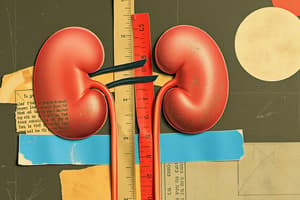Podcast
Questions and Answers
Why should table salt and high-sodium foods be reduced?
Why should table salt and high-sodium foods be reduced?
- To increase the risk of osteoporosis
- To avoid competition with calcium reabsorption in the kidneys (correct)
- To prevent oxalate stones formation
- To prevent calcium stones formation
What is the primary reason for not generally recommending low-calcium diets?
What is the primary reason for not generally recommending low-calcium diets?
- They lead to an increased risk of kidney stones
- They are ineffective in reducing urinary calculi
- They support the reabsorption of calcium in the kidneys (correct)
- They prevent osteoporosis
Which type of stones may result from excess dietary calcium in patients with type 2 absorptive hypercalciuria?
Which type of stones may result from excess dietary calcium in patients with type 2 absorptive hypercalciuria?
- Uric Acid Stones
- Oxalate Stones
- Cystine Stones
- Calcium Stones (correct)
What is the recommended intake of cranberry juice per day to prevent stone formation?
What is the recommended intake of cranberry juice per day to prevent stone formation?
Why are activities leading to sudden increases in environmental temperatures discouraged for individuals at risk of stone formation?
Why are activities leading to sudden increases in environmental temperatures discouraged for individuals at risk of stone formation?
How often should fluids be consumed during the day to prevent stone formation?
How often should fluids be consumed during the day to prevent stone formation?
What percentage of stones in men are uric acid stones?
What percentage of stones in men are uric acid stones?
Which type of stones form in persistently alkaline, ammonia-rich urine?
Which type of stones form in persistently alkaline, ammonia-rich urine?
What are common bacteria associated with the formation of struvite stones?
What are common bacteria associated with the formation of struvite stones?
Which condition is NOT a predisposing factor for struvite stone formation?
Which condition is NOT a predisposing factor for struvite stone formation?
In patients with which condition can urinary stone formation occur due to increased oxalate absorption?
In patients with which condition can urinary stone formation occur due to increased oxalate absorption?
Which medication is NOT known to cause stone formation in some patients?
Which medication is NOT known to cause stone formation in some patients?
What medication may be used for increased parathormone production that results in increased serum calcium levels in blood and urine?
What medication may be used for increased parathormone production that results in increased serum calcium levels in blood and urine?
What dietary recommendation is beneficial for reducing uric acid stones?
What dietary recommendation is beneficial for reducing uric acid stones?
Which medication can be prescribed to reduce serum uric acid levels and urinary uric acid excretion for patients with uric acid stones?
Which medication can be prescribed to reduce serum uric acid levels and urinary uric acid excretion for patients with uric acid stones?
What intervention might be recommended for patients with cystine stones?
What intervention might be recommended for patients with cystine stones?
Which food group should be avoided to limit oxalate intake according to the text?
Which food group should be avoided to limit oxalate intake according to the text?
What procedure is used for removing small stones located in the ureter close to the bladder?
What procedure is used for removing small stones located in the ureter close to the bladder?
Flashcards are hidden until you start studying




